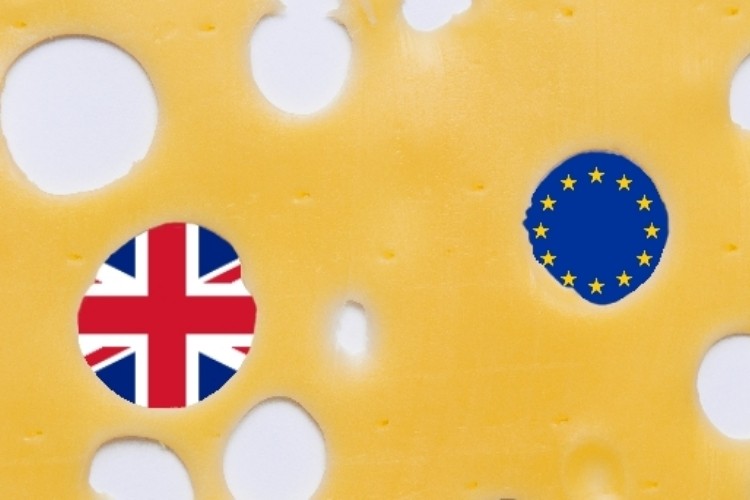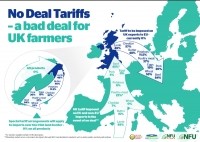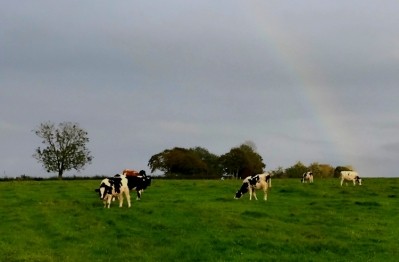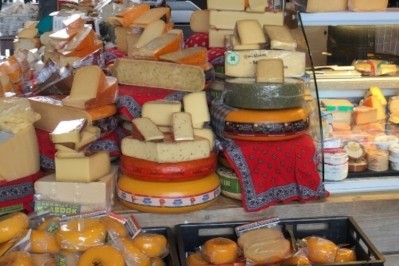UK cheese exports could be hit with tariffs in no-deal Brexit

Under the current no-deal applied trade tariffs, the UK would be forced to trade on World Trade Organisation (WTO) rules, meaning UK farmers would face higher fees on exports such as 48% on butter and 57% on cheddar. They currently are exported with 0% tariffs.
Butter and cheddar coming into the UK from the EU would be subjected to 15% and 7% tariffs respectively.
In the letter, NFU president Minette Batters reaffirmed the NFU’s view that a no-deal Brexit would be a disaster for British farming and that any exit of the EU must be smooth and orderly.
Batters said, “If we leave without a deal the sudden change in our trading relationship with the EU will have severe impacts on the UK food and farming sectors, not least due to the tariff treatment of both imports and exports.
“Clearly the imposition of tariffs on our exports to the EU will most likely lead to a surplus of domestic products on the UK market, while at the same time lower or no tariffs on imports into the UK will put further pressure on domestic producer prices.”
Batters added that there is also a risk that without the maintenance of tariff protections the UK would be in danger of opening up to imported food that would be illegal to be produced here.
“The situation is particularly stark on the island of Ireland where no tariffs will be collected on imports across the land-border. There is no indication that such an arrangement will be reciprocated by the EU and there is nothing in practical terms to stop this trade becoming an open gateway for all EU goods entering the UK duty free.”
The NFU is asking the Prime Minister to adjust the zero tariff that has been set on eggs, some dairy products, horticultural products and grains; review the zero-tariff arrangements for the land border on the island of Ireland; and ensure detailed arrangements are in place for robust and timely market monitoring to understand the impact of the tariff regime and to enable remedial action adjusting tariffs if necessary.
Batters said, “We understand this tariff policy is intended to be temporary and in response to an undesirable situation. However, it’s imperative that such an approach does not form the basis for the UK’s long-term international trade policy.
“Government must act now to address our concerns and revise the tariff regime to try and lessen the significant damage which a no-deal would inflict on the UK farming sector.”
She said it is also important the government manages prices for the public in a no-deal scenario - these tariff arrangements will have little impact on retail food prices yet could have a massive impact on the viability of farm businesses.
“Safeguarding Britain’s food producers and our domestic food supply has never been more important. Leaving the EU, our closest neighbor and trading partner, in a smooth and orderly way is vital to allow our farm businesses to have a viable and sustainable future.”
Former Prime Minister weighs in
Further to the NFU’s call for safeguarding the UK’s food supply, former Prime Minster Gordon Brown has joined GMB, the union for food workers, Hope Not Hate, and food charity sustain, to demand the Prime Minister ‘comes clean’ on the potentially disastrous risks a no deal Brexit will have on UK food supply.
The letter warns Johnson to ‘crash out of the EU without a deal poses a grave risk to the entire country’s food supply’.
It demands answers to nine key questions about Government preparations to cope with food shortages and price rises and the subsequent effects on families, the vulnerable, public services, the voluntary sector and workers in the food industry.
Brown said, “A no deal Brexit threatens the UK’s food supply chain. Imports of almost a third of our food could be subject to disruption.
“Uncertainty, restricted supplies and a weakened pound could raise prices. This would be a catastrophe for the food industry but also for family budgets, hospitals and those driven to food banks due to the decimation of our social security system over the last decade.
“In the North West, 83,000 three-day emergency food parcels were given to children by the Trussell Trust in 2018/19. We cannot put the future of the most vulnerable people in our country at risk as Prime Minister Johnson and his advisers stand to lose nothing.
“Let’s stop no deal, stand up for our future and start fixing the problems really impacting people’s lives in this country.”
Tim Roache, GMB general secretary, said, “No deal is no joke - it makes no sense for working people.
“The risks are writ large when it comes to the food we eat. With all the talk about coups and leave promises written on the side of buses, the real detail often gets missed. It's time for Boris Johnson to come clean.
“With no deal, we’re likely to see a huge impact on everything from increased cost of the family shop and less choice on supermarket shelves, through to job losses in food production and reduced nutrition in school and hospital meals.
"The Government are walking us to a cliff edge and seem more interested in ideological Tory Party politicking than making sure we have a stable food supply.”








